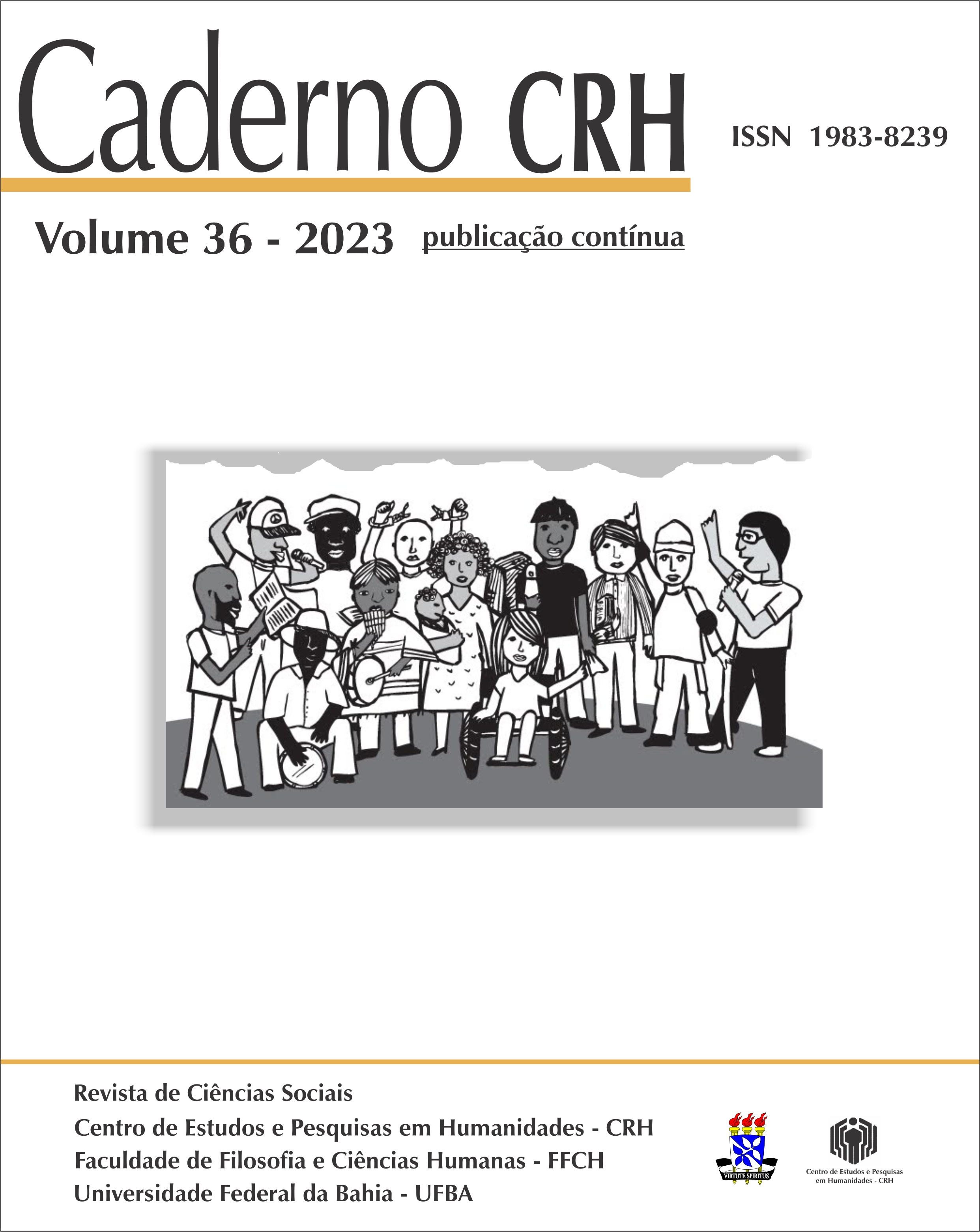DEFENSE COALITIONS IN MARITIME CARGO TRANSPORTATION POLICY IN BRAZIL: privatization, decentralization and opening to foreign capital
DOI:
https://doi.org/10.9771/ccrh.v36i0.55996Keywords:
Policy Process, Maritime Transport, Advocay Coalitions, Changes in public policiesAbstract
The central question was the following: how and which defense coalitions influenced the Policy in the period studied and what were the beliefs and
values that delineated these coalitions? The work dialogued with the Advocacy Coalition Framework (ACF). The characterization of the coalitions
was defined based on three policy core beliefs: centralize or decentralize decisions on concessions and budgetary management of resources arising from commercial maritime activity; exploitation of services linked to the sector by public authorities or
private initiative; opening or not of foreign capital participation in port and navigation exploration (Campos de Oliveira, You and Coelho, 2021). In
sequence, three moments were determined to carry out a diachronic comparative study: the civilmilitary
dictatorship (1964/85), the reference for comparison with other periods; the constituent process of 1987/88 (T1); and the Port Modernization Law (T2). In the end, the work identified the
National Corporate Industrial Coalition as dominant in the policy subsystem. It was possible to identify greater conflict in the reform attempt carried out in
1993, without the potential, however, to generate significant changes in the policy.
Downloads
References
BNDES. Banco Nacional do Desenvolvimento Econômico Social. 2012. Relatório Consolidado: Análise e Avaliação da Organização Institucional e da Eficiência de gestão do Setor Portuário Brasileiro. Ano 2012. Booz & Company do Brasil Consultores Ldta, Verax Consultoria ee Projetos, Logit engenharia Consultiva e Machado, Meyer, Sendacz e Opice Advogados.
BROOKS, M. R., CULLINANE, K. P. B., & Pallis, A. A. (2017). Revisiting port governance and port reform: A multi-country examination. Research in Transportation Business & Management, 22, 1-10. doi:10.1016/j.rtbm.2017.02.005
CAMPOS DE OLIVEIRA, Henrique Campos; YOU, Jongeun; COELHO, André Pires. Governing coalitions and key performance indicators of port governance. Maritime Transport Research, v. 2, p. 100023, 2021.
COCCO, Giuseppe; SILVA, Gerardo (Org.). Cidades e Portos: os espaços da globalização. Rio de Janeiro: Dp&a, 1999.
DOCTOR, Mahrukh. Business-State Relations in Brazil: Challenges of the Port Reform Lobby. New York: Routledge, 2017.
GALVÃO, Cassia Bömer. Política de Desenvolvimento Portuário Brasileiro: uma abordagem multidimensional do período 1993-2013. 2017. 463 f. Tese (Doutorado) - Curso de Doutorado em Ciências Sociais, Pontifícia Universidade Católica de São Paulo, São Paulo, 2017. Disponível em: <https://tede2.pucsp.br/bitstream/handle/19681/2/Cassia Bömer Galvão.pdf>. Acesso em: 10 mar. 2018.
JENKINS-SMITH, H.; NOHRSTEDT, D.; WEIBLE, C. M.; INGOLD, K. The Advocacy Coalition Framework: An Overview of the Research Program. In: WEIBLE, C. M.; SABATIER, P. A. (Eds.). Theories of the Policy Process. New York: Westview Press, 2017, 4. ed
JENNIE LITVACK (Eua). Columbia University (ed.). What is Decentralization? 2019. Contato responsável: Jennie Litvack. Disponível em: http://www.ciesin.org/decentralization/English/General/Different_forms.html. Acesso em: 18 jun. 2019.
LANGEN, Peter W. Stakeholders, Conflicting Interests and Governance in Port Clusters. In: Brooks, Mary r.; Cullinane, Kevin. Devolution, port governance and port performance. Amsterdan: Elsevier, 2007. P. 457-477.
LEIFELD, P., JOHANNES B. GRUBER, and BOSSNER, F. R. Discourse Network Analyzer Manual. https://github.com/leifeld/dna/releases/download/v2.0-beta.24/dna-manual.pdf.2018
LITVACK, J. (2019). What is Decentralization? Center for International Earth Science Information Network. Retrieved from: http://www.ciesin.org/decentralization/English/General/Different_forms.html
MONIÉ, F.; VIDAL, Soraia Maria do S. C. Cidades, portos e cidades portuárias na era da integração produtiva. Revista de Administração Pública, v. 40, n. 6, 2006. doi:10.1590/S0034-76122006000600003.
MONIOS, J.; WILMSMEIER, G. Between path dependency and contingency: New challenges for the geography of port system evolution. Journal of Transport Geography, v. 51, 2016. doi:10.1016/j.jtrangeo.2016.01.008
NOTTEBOOM, T., & RODRIGUE, J. (2012). The corporate geography of global container terminal operators. Maritime Policy and Management, 39(3), 249-279. doi:10.1080/03088839.2012.671970
OLIVEIRA, Henrique Campos de. A Política Portuária no Brasil no recente contexto democrático: A quiçá de um consenso em prol do desenvolvimento. In: SOUZA, Cláudio André de; NETO, Jaime Barreiros. (Org.). DemocraciaBR: o momento político. Salvador: Faculdade Baiana de Direito. 2015.
SABATIER, Paul A.; JENKINS-SMITH, Hank C. Policy change and learning: an advocacy coalition approach. Oxford: Westview Press, 1993.
SANTOS, F. G. Dinâmica congressual e regulação econômica: O caso da lei portuária. Revista Brasileira de Ciências Sociais, v. 13, n. 34, 1997
SANTOS, Iris Gomes dos. Segurança Pública no Brasil: uma análise institucional.1/ ed. Belo Horizonte/MG. Fino Traço. 2022.
SLACK, B.; STARR, J.T. Ports as gateways: a traditional concept revisited in 5 ème Conférence Internationale Villes et Ports, AIVP, Dakar, 1999.
VERHETSEL, Ann; SEL, Steve. World maritime cities: from which cities do container shipping companies make decisions?. Transport Policy, [S.L.], v. 16, n. 5, p. 240-250, set. 2009. Elsevier BV. http://dx.doi.org/10.1016/j.tranpol.2009.08.002.
WEIBLE, C. M.; INGOLD, K.; NOHRSTEDT, D.; HENRY, A. D.;JENKINS‐SMITH, H. C. Sharpening advocacy coalitions. Policy Studies Journal, 2019 doi:10.1111/psj.12360.
Downloads
Published
How to Cite
Issue
Section
License

This work is licensed under a Creative Commons Attribution 4.0 International License.
Todo o conteúdo da revista, exceto onde indicado de outra forma, é licenciado sob uma atribuição do tipo Creative Commons BY.
O periódico Caderno CRH on-line é aberto e gratuito.





